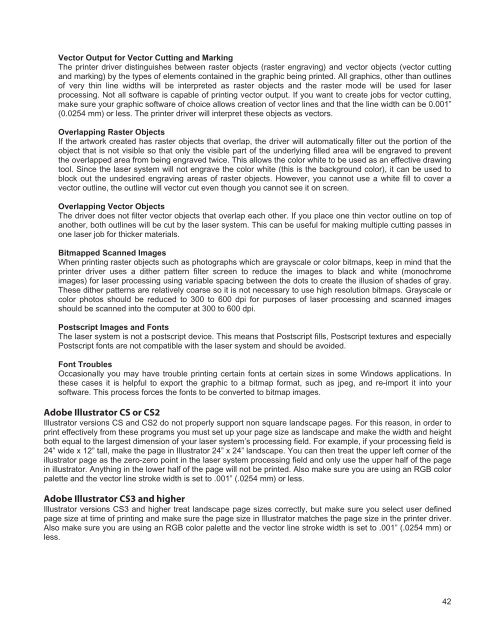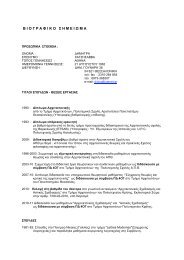VersaLASER® (VLS) User Guide VLS2.30, VLS3.50
VersaLASER® (VLS) User Guide VLS2.30, VLS3.50
VersaLASER® (VLS) User Guide VLS2.30, VLS3.50
You also want an ePaper? Increase the reach of your titles
YUMPU automatically turns print PDFs into web optimized ePapers that Google loves.
Vector Output for Vector Cutting and Marking<br />
The printer driver distinguishes between raster objects (raster engraving) and vector objects (vector cutting<br />
and marking) by the types of elements contained in the graphic being printed. All graphics, other than outlines<br />
of very thin line widths will be interpreted as raster objects and the raster mode will be used for laser<br />
processing. Not all software is capable of printing vector output. If you want to create jobs for vector cutting,<br />
make sure your graphic software of choice allows creation of vector lines and that the line width can be 0.001”<br />
(0.0254 mm) or less. The printer driver will interpret these objects as vectors.<br />
Overlapping Raster Objects<br />
If the artwork created has raster objects that overlap, the driver will automatically filter out the portion of the<br />
object that is not visible so that only the visible part of the underlying filled area will be engraved to prevent<br />
the overlapped area from being engraved twice. This allows the color white to be used as an effective drawing<br />
tool. Since the laser system will not engrave the color white (this is the background color), it can be used to<br />
block out the undesired engraving areas of raster objects. However, you cannot use a white fill to cover a<br />
vector outline, the outline will vector cut even though you cannot see it on screen.<br />
Overlapping Vector Objects<br />
The driver does not filter vector objects that overlap each other. If you place one thin vector outline on top of<br />
another, both outlines will be cut by the laser system. This can be useful for making multiple cutting passes in<br />
one laser job for thicker materials.<br />
Bitmapped Scanned Images<br />
When printing raster objects such as photographs which are grayscale or color bitmaps, keep in mind that the<br />
printer driver uses a dither pattern filter screen to reduce the images to black and white (monochrome<br />
images) for laser processing using variable spacing between the dots to create the illusion of shades of gray.<br />
These dither patterns are relatively coarse so it is not necessary to use high resolution bitmaps. Grayscale or<br />
color photos should be reduced to 300 to 600 dpi for purposes of laser processing and scanned images<br />
should be scanned into the computer at 300 to 600 dpi.<br />
Postscript Images and Fonts<br />
The laser system is not a postscript device. This means that Postscript fills, Postscript textures and especially<br />
Postscript fonts are not compatible with the laser system and should be avoided.<br />
Font Troubles<br />
Occasionally you may have trouble printing certain fonts at certain sizes in some Windows applications. In<br />
these cases it is helpful to export the graphic to a bitmap format, such as jpeg, and re-import it into your<br />
software. This process forces the fonts to be converted to bitmap images.<br />
Adobe Illustrator CS or CS2<br />
Illustrator versions CS and CS2 do not properly support non square landscape pages. For this reason, in order to<br />
print effectively from these programs you must set up your page size as landscape and make the width and height<br />
both equal to the largest dimension of your laser system’s processing field. For example, if your processing field is<br />
24” wide x 12” tall, make the page in Illustrator 24” x 24” landscape. You can then treat the upper left corner of the<br />
illustrator page as the zero-zero point in the laser system processing field and only use the upper half of the page<br />
in illustrator. Anything in the lower half of the page will not be printed. Also make sure you are using an RGB color<br />
palette and the vector line stroke width is set to .001” (.0254 mm) or less.<br />
Adobe Illustrator CS3 and higher<br />
Illustrator versions CS3 and higher treat landscape page sizes correctly, but make sure you select user defined<br />
page size at time of printing and make sure the page size in Illustrator matches the page size in the printer driver.<br />
Also make sure you are using an RGB color palette and the vector line stroke width is set to .001” (.0254 mm) or<br />
less.<br />
42




